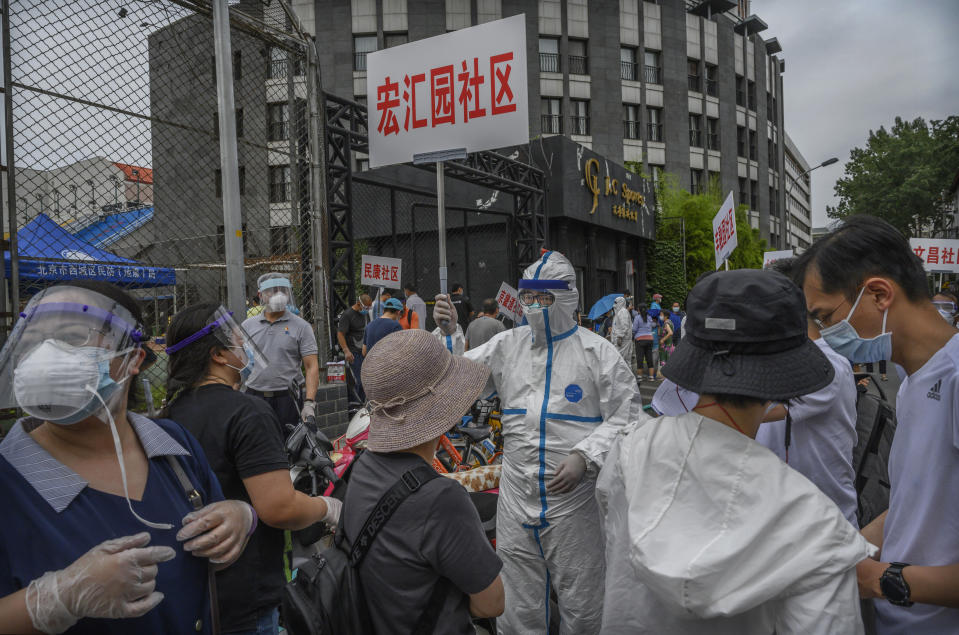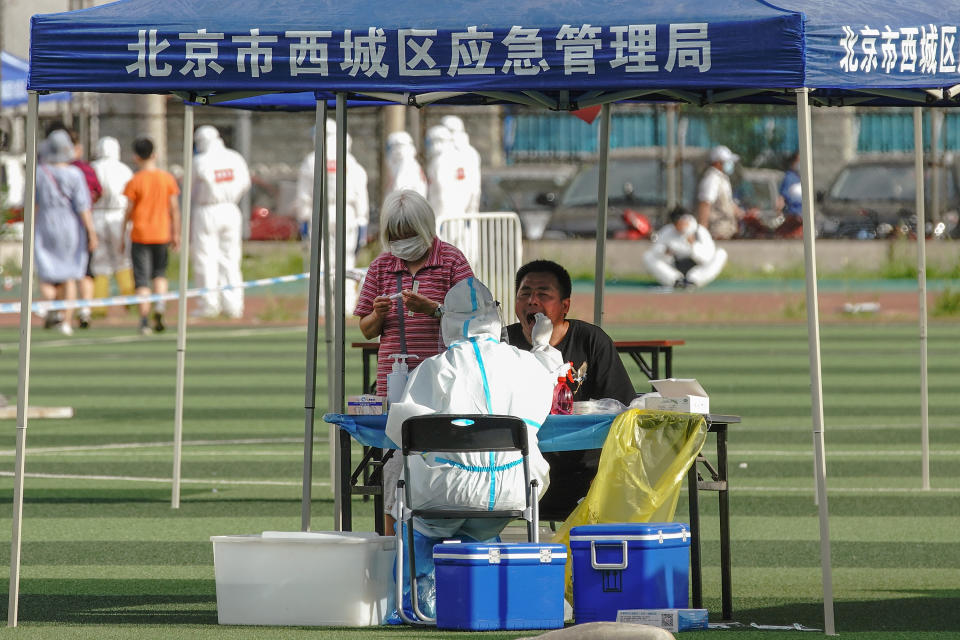Beijing brings back lockdown as 100 new cases linked to fresh coronavirus outbreak

Parts of Beijing have had to reintroduce lockdown after a cluster of around 100 new confirmed cases of coronavirus have been linked to a major wholesale food market.
The World Health Organization (WHO) said on Monday that the origins of the fresh outbreak, surfacing two months after the Chinese capital stamped out the virus, were “uncertain” but that it may have been caused by imports or packaging of salmon.
State-run newspapers reported that the virus was discovered on chopping boards at Beijing's Xinfadi market in the southern Fengtai district, amid worries about a second wave of the pandemic in China.
The first case in the new outbreak was discovered on Thursday after a 52-year-old man tested positive, prompting his district to raise its risk level to medium.
On Saturday, 53 people had tested positive for coronavirus in the city. Contact tracing showed that nearly everyone who tested positive had worked or shopped at the market.
Since then, several districts of Beijing put up security checkpoints, closed schools and ordered people to be tested for coronavirus.

"The containment efforts have rapidly entered into a war-time mode," senior city government official Xu Ying told a news conference.
Xu said 7,200 neighbourhoods and nearly 100,000 epidemic-control workers had entered the "battlefield".
The Beijing authorities have now shut down Xinfadi market after the virus was reportedly detected on cutting boards for imported salmon there.
Experts said on Monday that the fish itself was unlikely to carry the disease and any link to salmon may have been the result of cross-contamination.
Read more: UK not included as EU reopens borders for tourists
Mike Ryan, head of the WHO's emergencies programme, said in a briefing: "As we have seen in many countries, the emergence of new clusters... is always a concern.
"But what we do like to see is an immediate response to that and comprehensive set of measures."
The return of coronavirus has shrouded Beijing, home to the headquarters of many big corporations, in uncertainty at a time when China is trying to shake off the economic lethargy caused by the disease.


The outbreak has been traced to the sprawling Xinfadi market where thousands of tonnes of vegetables, fruits and meat change hands each day.
The new cases have led to many parts of Beijing to reimpose tough measures to stifle the spread of the virus.
The capital is taking steps to try to halt the outbreak including ramping up testing.
On Sunday night, Beijing ordered all companies to supervise 14-day home quarantine for employees who have visited the Xinfadi market or been in contact with anyone who has done so.
Residents are being advised to avoid crowds and gathering in groups for meals.
Read more: Coronavirus UK alert level remains at 4 despite lockdown being eased in England
Some districts even sent officials to residential compounds in what they described as a "knock, knock" operation to identify people who had visited Xinfadi.
Access to the neighbourhoods of the people who were infected has been blocked as tests are being administered to residents.
The 11 neighbourhoods around Xinfadi and 10 others near another market have also been sealed as 90,000 residents undergo tests.
The World Health Organization said on Sunday it had been informed of the outbreak and an investigation by Chinese officials.


"WHO understands that genetic sequences will be released as soon as possible once further laboratory analyses are completed," it said in a statement.
China has halted imports from European salmon suppliers amid fears they might be linked to a coronavirus outbreak at a Beijing market, although experts say the fish itself is unlikely to carry the disease.
Read more: New Zealand's lockdown contained coronavirus. Now comes the hard part
An epidemiologist with the Beijing government said on Sunday that a DNA sequencing of the virus showed the latest outbreak in the market could have come from Europe.
"Our preliminary assessment is the virus came from overseas. We still can't determine how it got here. It might've been on contaminated seafood or meat, or spread from the faeces of people inside the market," state media quoted Yang Peng as saying.
Coronavirus: what happened today
Click here to sign up to the latest news, advice and information with our daily Catch-up newsletter
Read more about COVID-19
How to get a coronavirus test if you have symptoms
How easing of lockdown rules affects you
In pictures: How UK school classrooms could look in new normal
How public transport could look after lockdown
How our public spaces will change in the future
Help and advice
Read the full list of official FAQs here
10 tips from the NHS to help deal with anxiety
What to do if you think you have symptoms
How to get help if you've been furloughed

 Yahoo News
Yahoo News 

